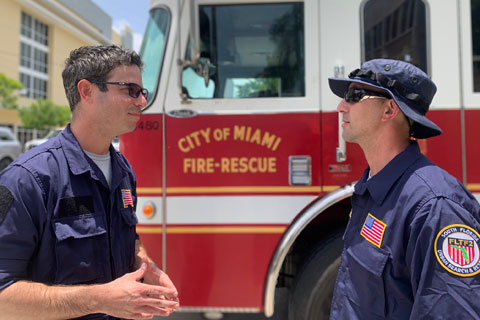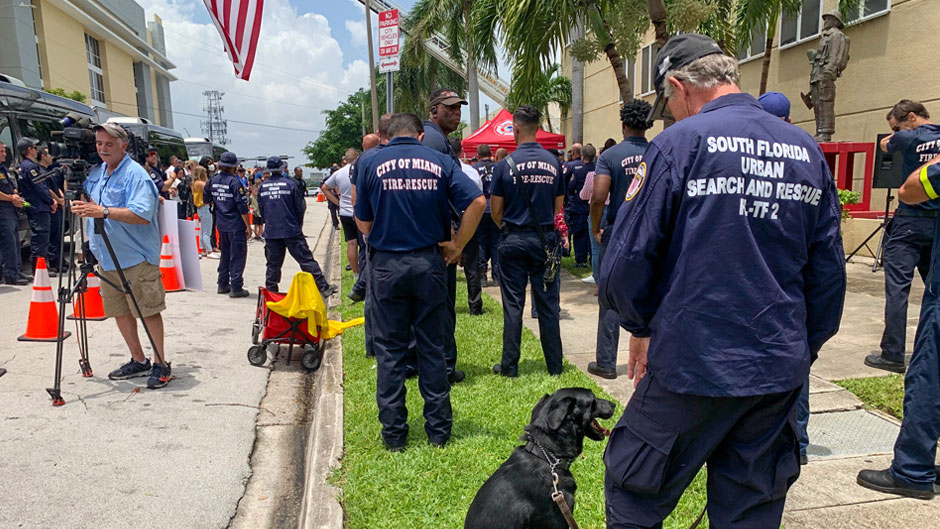MIAMI—With a motorcycle police escort leading the way, the convoy of massive equipment vehicles and ladder trucks pulled up to the front of Miami Fire-Rescue headquarters just after 12:30 p.m. Friday, dozens of first responders from the South Florida Urban Search and Rescue Team/Task Force 2 immediately disembarking.
One of them was Brandon Parker, an assistant professor of surgery in the Division of Trauma and Surgical Critical Care at the University of Miami Miller School of Medicine and a father of two.
It had been nearly a month since he and the other team members were deployed to the town of Surfside to search for the missing victims of the 12-story Champlain Towers South condominium collapse. So, their arrival to hundreds of waiting family members, friends, and city officials on Friday was a homecoming of sorts.
But even after the welcome embraces and handshakes, the nearly 100 people who perished in the catastrophe were still fresh in Parker’s thoughts.
“It was always our objective to bring people out alive, and that’s what kept us on the debris pile even when we were told to come off,” said Parker, medical team manager for Task Force 2. “At times, the family members of the victims were allowed on the scene. We were able to see and hear their anguish, and that drove us to search even harder.”

Like most people, Parker was asleep when the collapse occurred, learning of the tragic event only after awakening to watch the morning newscasts. Then, after a series of text messages from colleagues, he realized he would soon be ordered to the sight—his first deployment as a Task Force 2 team member.
“It changed me forever,” he said Friday, adding that working with the “dedicated women and men on the team was inspiring” even in the face of tragedy.
Parker’s primary responsibilities were to care for team members as they rotated off the debris field and to render medical aid to any survivors. But whenever he wasn’t acting in that capacity, he lent his muscle to the effort, helping to move heavy pieces of concrete and erect operational and sleeping tents.
Before Parker arrived in Surfside to begin his deployment, he had only seen images of the condo collapse on television and on social media platforms. But being at the site gave him a completely new perspective of the disaster. “It was surreal,” he said. “To be up close and see the devastation that was contained in that pile took the words away from all of us.”
He described it as an unearthly scene, one with a peculiar paucity of conversation—just the clangor of heavy machinery as Task Force 2 responders searched for any victims who may have been alive but trapped beneath the rubble.
There were times during his deployment that were emotionally demanding, such as when the 7-year-old daughter of a Miami firefighter was discovered among the victims. It was moments like that when team members turned to each other for support, Parker said.
He kept a diary during his deployment, recording his daily experiences. And having another Miller School colleague on-site, pediatric critical care physician G. Patricia Cantwell, was “tremendously helpful,” Parker said.
Cantwell is a longtime veteran of Task Force 2, having been deployed to ground zero in Lower Manhattan after the 9/11 terrorist attacks and in Haiti after the devastating 2010 earthquake. She, Parker, and many other first responders have received training at the Miller School’s Gordon Center for Simulation and Innovation in Medical Education, which Ahmed Abousaleh, medical coordinator for Task Force 2, described as “indispensable.”
During Friday’s welcome home ceremony, City of Miami Fire Chief Joseph Zahralban acknowledged the emotional strain Task Force 2 team members experienced and pledged his department’s support of those first responders. “We are here for you. If you’re having any difficulty, reach out to us,” Zahralban said.
But it was staying busy during the deployment that probably helped Parker cope most of all, he said. ‘There were rotations when I came off and other doctors were active. And in some ways, I think it was emotionally harder to deal with the stressors when we were not on scene,” he explained. “Being there and being active and feeling like you were contributing to the overall mission kept us going.”

